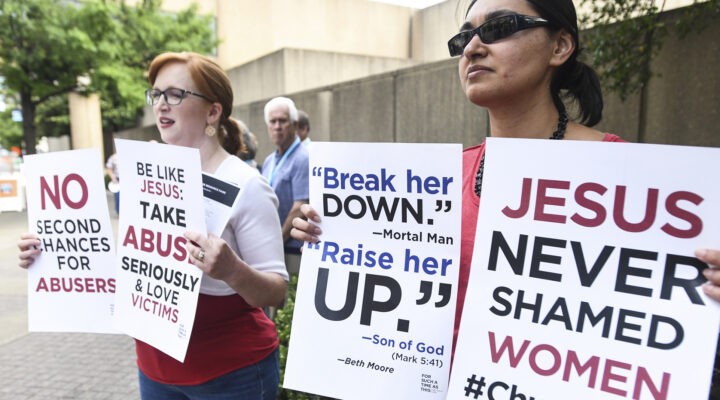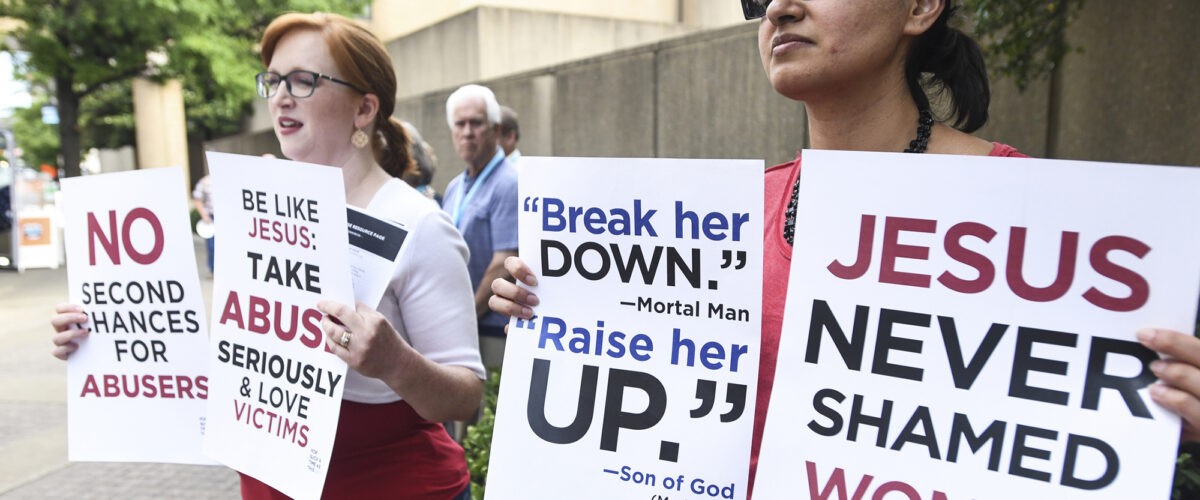When a member of the Southern Baptist Convention’s prior Sexual Abuse Task Force emailed me to apologize, I felt grateful for the candor and honesty.
“I want to personally apologize to you,” the person wrote, “if anything I did ever gave you hope for change in the SBC. I see now it was futile. … Nothing will change. The system as designed will not allow it.”

Christa Brown
As heartbreaking as this statement is, at least it’s truthful. And ultimately, truth is kindness.
Truth is infinitely better than phony institutional hype about “progress,” public relations showmanship and duplicitous performative faux-caring.
In the absence of tangible care for survivors and the naming of credibly accused pastors on a database, the rosy institutional narrative of “progress” lands as gaslighting and cruelty.
As GRACE founder Boz Tchividjian said: “Church leaders who speak empathetic words and make empty promises without substantive and self-sacrificing actions are exploiting and re-victimizing the abuse survivors.”
So, I pray that members and advisers to the SBC’s Abuse Reform Implementation Task Force will not let themselves be used as pawns for making things appear to be what they aren’t. It would be far kinder if they were to acknowledge the reality that meaningful reform is not happening and to resign in protest.
“It would be far kinder if they were to acknowledge the reality that meaningful reform is not happening and to resign in protest.”
This reality is something about which there can no longer be any doubt.
Thanks to journalists, we now know that even while SBC officials were putting on a show at the June 2023 annual meeting, touting the launch of an empty shell of a database as “historic,” and even while they were promoting their uncaring “Caring Well Sunday” in September, behind the scenes, they already had filed an amicus brief in a Kentucky case — a case in which the SBC isn’t even a party — to actively argue against even the possibility of justice for child sex abuse survivors.
The duplicity was plain for all to see.
SBC Executive Committee members claimed they were surprised by the amicus brief. SBC President Bart Barber, who signed off on the amicus brief, claimed he hadn’t given it the consideration it deserved and expressed regret.
But despite the public posturing, no effort was made to undo the harm. Nor does it appear anyone faced any consequence for it. SBC officials didn’t renounce the amicus brief; nor did they even take the minimal step of withdrawing the brief. And they certainly didn’t substitute any new brief in support of child sex abuse survivors.
They did nothing.
And consider what we’ve learned from the sexual abuse lawsuit involving Paul Pressler. Documents produced by the SBC Executive Committee “spelled out the SBC defense philosophy of delay, filing a multitude of motions, and blaming the victim.”
Although this wasn’t surprising — SBC officials have long worked to crush SBC clergy abuse survivors — having this tactic spelled out in the SBC Executive Committee’s own documents should give pause to any doubters. And again, this kind of behind-the-scenes “stonewalling” was going on at the same time as SBC officials’ performative displays of caring about abuse.
It’s illustrative of how little has actually changed. Just as was documented in the Guidepost report, SBC officials still remain “singularly focused on avoiding liability for the SBC to the exclusion of other considerations.”
 Next, consider the task force’s own membership. In October 2022 and December 2023, former BNG Clemons Fellow David Bumgardner wrote to Bart Barber and the task force, detailing serious corroborated concerns about task force member Greg Wills. Bumgardner alleged that, while at Southwestern Baptist Theological Seminary, Wills had sought to obtain confidential information about an SBC sexual abuse survivor and threatened retribution against those who sought to assist the survivor.
Next, consider the task force’s own membership. In October 2022 and December 2023, former BNG Clemons Fellow David Bumgardner wrote to Bart Barber and the task force, detailing serious corroborated concerns about task force member Greg Wills. Bumgardner alleged that, while at Southwestern Baptist Theological Seminary, Wills had sought to obtain confidential information about an SBC sexual abuse survivor and threatened retribution against those who sought to assist the survivor.
Yet, despite knowing about these concerns for more than a year, neither Barber nor the task force have addressed them. If the task force won’t give serious consideration to allegations about its own members, why should any of us think they will be able to address allegations against pastors in the 47,000 churches of the SBC?
Furthermore, a couple weeks ago, it came to light that Wills has a prior relationship with an accused abuser who is a co-defendant in litigation against the SBC. That, too, raises serious concerns about the propriety of his presence on the task force, and it leads me to ask: Why did Barber appoint Wills to the task force?
An Oklahoma minister offered his take on that question: “Any task force created by the SBC for accountability will always have at least one or two people strategically placed on it to ensure no accountability actually happens.”
Finally, there is the fact that the SBC has added not a single name of any credibly accused pastor to its purported database. Not one.
It hasn’t even named those criminally convicted. Nor has it bothered to transfer to the new database the hundreds of names that were on the Executive Committee’s long-secret list. Furthermore, by its own admission, the task force has completely stalled out on including the most needed category of names — pastors determined to be “credibly accused” by independent investigation.
Thus, the SBC’s Abuse Reform Implementation Task Force has managed to do even less than the “bare minimum” that was previously promised.
And don’t even get me started on the SBC’s sexual abuse hotline. Despite being called a “hotline,” it doesn’t seem to trigger urgent action, and despite hundreds of reports made to it, the SBC has released no information about who those reported pastors are, or whether congregants in their churches have been informed. The hotline appears as little more than a theater piece; it presents an illusion of accountability but without the reality.
“The SBC’s Abuse Reform Implementation Task Force has managed to do even less than the ‘bare minimum’ that was previously promised.”
It’s been nearly 20 months since release of the Guidepost report, five years since the Abuse of Faith series, and 17 years since the ABC 20/20 exposé. Yet this is where the SBC still is: the needle has scarcely moved.
This is not progress; it’s performance.
And while some may talk of “incremental progress,” the reality is that incrementalism can be a form of complicity and cruelty. When incrementalism is so slow that it resembles inertia, it’s a sure sign the institution doesn’t really care.
Religion writer Bob Smietana recently summed up the situation: “Despite promised reforms, little has changed. A proposed database of abusive pastors remains empty of names, there is no permanent funding for reforms, and there seems to be little momentum to move forward.”
For all these reasons — and more — I urge that every member and adviser on the SBC’s Abuse Reform Implementation Task Force should resign in protest. This would be an act of integrity and kindness.
As individuals, some of them may indeed yearn for the SBC to do right. But yearnings will not make it so. And the ugly truth is better than no truth.
The task force members and advisers may not have been able to change the SBC, but they could at least be honest about the reality of what’s happening: The SBC is stymied on abuse reform.
By their continued presence, task force members and advisers lend credibility to an institution that is unworthy of credibility.
Christa Brown, a retired appellate attorney, is the author of This Little Light: Beyond a Baptist Preacher Predator and his Gang and a forthcoming memoir, due out spring 2024, called In Baptistland. Follow her on Twitter @ChristaBrown777.
Related article:
‘It was futile … nothing will change’ | Opinion by Christa Brown


